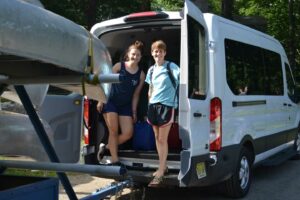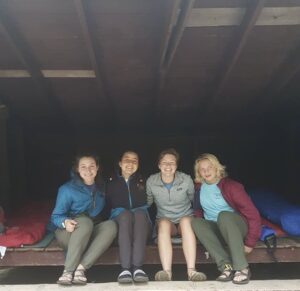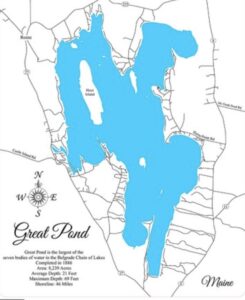“Why camp?” is a prompt that seemingly pulls my whole life, identity, and personality into question. As my director at my alma mater’s office of outdoor pursuits would say, we are “camp people.” She used this as a way of not necessarily vetting the people and employees she let into her life and office, but more as a sign that she had found a kindred spirit. I remember her delighted reaction – a reaction with the animation of a camp person – during my graduate assistantship interview when I told her that I was a camp kid. To us, it is an indication of just the kind of person we’d like to work with, and someone who we know we can connect to. In my twenty-six years, being a “camp person” remains the quickest, most sincere source of connection to strangers that I’ve personally experienced. It shows in Runoia’s staff training each year, where friendships are forged in two short weeks, grown in the following eight weeks, and maintained for lifetimes following. It reminds me of my own childhood camp, where sessions were only one-week long, yet resulted in friendships that remain in adulthood. Camp is where I found a deeper connection each summer to my sister, who is now my best friend.
So to us, and to many of my other camp connections, knowing someone is a “camp person” is like a preview to who they are. A “camp person” can be anyone, of any and every identity, but a few things always hold true. To me, they are: a person who values connection with nature, others, and themselves; someone who builds and draws on their community in their toughest moments; a person who shows flexibility, empathy, and devotion to others; a person who shows devotion to themself. I can only speak for myself, but that sounds exactly like someone I’d like in my community and by my side.
I’ve noticed in recent years, in a time where we are almost constantly in front of a screen and expected to be one-hundred-percent available at all times, we sometimes mistake this accessibility for connection. True connection with others this way has, however, fallen short for me and many others. Camp is where we can seek authentic connections when we need them most, and to “build lifelong skills” in a unique place that is designed to facilitate growth. While our campers head home at the close of each summer eager to share the activities they participated in and the feats they’ve accomplished, they are also sharing their friendships, their personal victories, and the counselors they loved most. Beneath the hands-on skills our campers and staff learn at Runoia, we are quietly building the connection, community, flexibility, empathy, and devotion of “camp people”.
It’s funny to me, then, that I still identified as a “camp person” even in the time between the end of my own camper experience and landing at Runoia years later – a testament to the idea that camp never leaves us. When I first arrived at Runoia in 2018, I thought I was taking my last opportunity to have one camp summer in the open space between my undergrad and grad years. I did not expect to find a camp community again. I had remembered the importance of being a “camp person” myself, but completely rediscovered the magic of connection with other “camp people” that summer. My absence in summer 2021, taken to move across the country, solidified my need for a connection that most people may not know they’re missing if they’ve never experienced it.
Maine is not my home in the literal sense. I’ve never truly lived there, save for the three summers I’ve spent at Runoia. Even now, I’ve managed to move further away from Runoia, and my home camp for that matter, than I’ve ever been. And yet, coming back to Runoia – even just virtually for now – is a homecoming: a camp person stepping back into her camp-person-self with her camp people. And I am so happy to be home.
Colleen O’Malley – Assistant Director, Camp Runoia



